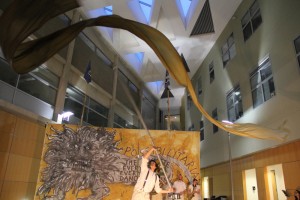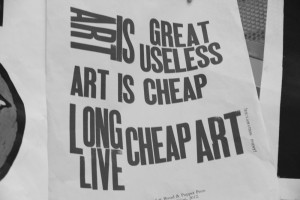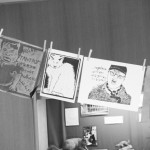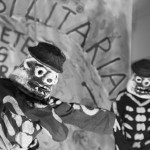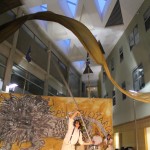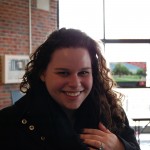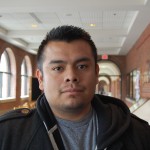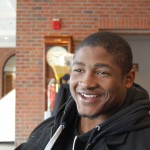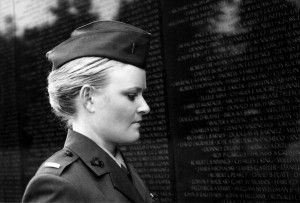Reporter’s Note: It is the view of this journalist that those behind the incidents described are a vocal minority in the OWU and Delaware communities. Nevertheless, these incidents are relevant to the entire community and need to be acknowledged and addressed. This article contains quoted slurs used against minority communities.
Racism
As an African-American student walks down the street, a car slows next to him as a passenger rolls down the window; “nigger!” the passenger yells before the driver speeds off.
Several members of Ohio Wesleyan’s African-American community, male and female alike, report having been victims of this kind of racist drive-by harassment.
Senior James Huddleston, co-president of Black Men of the Future (BMF), said he was walking down a street with five or six other African-American students when “a car drives past, and they (the passengers) just (yelled), ‘damn niggers!””
“I wasn’t trying to judge OWU for that, but that makes me look at the world different since (then),” Huddleston said. “That kinda changes the way you feel about the area or the society (you’re in).”
Senior Nicole Lourette, a member of Sisters United (SU), said she knew of two former students, both African-American women, who had “nigger bitch!” shouted at them as they walked down Sandusky Street.
“People don’t walk up to you and do something, but they’ll do it in the way they can (get away with it),” she said.
Senior Andrew Dos Santos, BMF co-president, said these things have happened to him “four or five different times.”
“(As I cross the street) a car just drives by – and I know this happens to everyone in (BMF) – and the driver yells ‘Hey, nigger! Nigger!’ and they speed off…They’re in the safety of their car—I can’t really do anything, I can’t run to the car and knock on their window and say ‘Hey, you really shouldn’t call me that.’”
Dos Santos said he’s heard of many other instances of racial epithets being shouted at black students, but students aren’t the perpetrators.
Junior Lehlohonolo Mosola, resident adviser of the House of Black Culture (HBC), agreed—he said most of the insults he’s heard have come from Delaware residents.
“In defense of the school, I’ve experienced less racism from the school and from the people who go here than probably any other school or place that I’ve been in for a long period of time in my life,” Mosola said.
“Now, the town around Ohio Wesleyan, it’s pretty bad, I’m not going to lie. I’ve certainly had obscenities screamed out of cars at me more times than any other place in my entire life. It makes no sense, because I’ve been in supposedly stereotypically way more racist places than this. That’s kinda against Delaware, but the school – I’ve had much less trouble here than I have in the past.”
Senior Nginyu Ndimbie has had a different experience—he said another student called him a “nigger” at a Halloween costume party.
“I wanted to slash him with this styrofoam sword that I spent all day making, and I just looked at him, and I’m just like, ‘No, that’s not cool,’” he said.
“To a degree, I wanted to scare him. I wanted to take him somewhere and tell him, ‘You’re lucky that you’re saying this to me and I don’t really mind this word, but the fact that you find it funny is not okay.’
“I truthfully did not have it in me; it ruined the whole party, just the idea that this kid felt so insulated that that word is a joke to him, was really bizarre to me.”
Lee Yoakum, Delaware’s city coordinator for Community Affairs, said in an email that these incidents are “not representative” of the Delaware community, and that the Delaware Police Department has received no complaints about racial slurs being shouted at OWU students.
“(W)e want to know about (such incidents),” he said.
“Students should contact OWU Public Safety and/or the Delaware Police Department.”
Legally, Delaware City Prosecutor Mark Corroto said in an email, authorities must “balanc(e) between free speech and menacing (or threats).”
Section 2903.22 of the Ohio Revised Code (ORC) defines menacing as knowingly causing another “to believe that the offender will cause physical harm to the person or property of the other person, the other person’s unborn, or a member of the other person’s immediate family.”
An individual who violates this section would be guilty of a fourth-degree misdemeanor; according to Section 2929.24, this would be punishable by a jail term of “not more than thirty days.”
ORC Section 2927.12, concerning “Ethnic intimidation,” lists Section 2903.22 as one of several not to be violated “by reason of the race, color, religion, or national origin of another person or group of persons.”
A menacing conviction was also found to violate this section would become a third degree misdemeanor, punishable by “not more than sixty days” in jail, according to Sections 2927.12 and 2929.24.
Corroto mentioned an incident several years ago where a black man was called the N-word by a Delaware resident and “punched the caller in the mouth.”
Despite it being a clear assault, Corroto said the jury acquitted him.
“It was, I must admit, a loss that I did not bemoan,” he said.
Several members of BMF described hearing more subtle racially-charged statements, sometimes even from roommates.
“I don’t think people even realize they’re being racist, but it’s just subtle undertones, it’s frustrating,” said sophomore Garrison Davis, a member of BMF and resident of HBC.
“I feel like people aren’t as outward with their racism, but they find ways to do it,” Lourette said.
“One thing that is a problem on this campus is stereotypes—stereotypes that people think black people do or are,” said sophomore Mariah Powell, president of SU.
She described having to watch “Madea Goes to Jail” with several white students, who asked her if this was what all black women were like. She said without such movies and TV shows, they wouldn’t have that image of African-Americans.
“So they just have this view of all black people because they’ve seen ‘Real Housewives of Atlanta,’ or ‘Bad Girls Club,’ or something like that, so they think I act like that too, and I don’t,” she said.
“…Other people, if they don’t know you, they don’t really know how to take who you are, so they just put you all in one big bubble.”
Members of BMF also discussed how societal expectations affect their ability to react to the racial taunts they’ve suffered.
“I like to talk to people about it,” Dos Santos said. “Something happens, they say something and I’m like, ‘Why do you think it’s okay to say that?’ instead of getting upset, because as soon as I get upset, I fulfill the stereotype—I’m the angry black man, and anything I say is nothing, so I have to be calm and logical.”
Senior Andrew Wilson said black students are “forced to react” this way when confronting racist actions.
“If someone outright calls me a fag or a nigger to my face, I can’t get mad at them because if I do, I’m insinuating a stereotype, and then that builds and that validates that stereotype, and that validates that action again,” he said.
“That’s not fair, but that’s the social construct, that’s the world we live in… I can’t get mad because if I get mad I’m going to be that angry black guy… We can’t do anything but sit in these meetings and vent, every single damn meeting we have.
“And that’s the purpose of BMF, SU, and SUBA, VIVA, VSA, Horizons (International), Chinese Culture Club, Hillel—is to vent about all these injustices that are imparted on us, but we can’t get mad about them because it’s not socially acceptable for us to get mad. I don’t understand that, and we don’t have conversations about that in our classes at all, and we don’t have those conversations with the people that we would like to have them with.
“We all know that it’s not okay to do all this stuff, but for the people that aren’t in this room, that won’t come to this (BMF) meeting… that don’t even see any of us on this campus, that’s who we want to talk to. That’s who we want to reach… It’s cool to be politically correct and all that shit, but there comes a time, like Dr. Martin Luther King says, there comes a time when silence works totally against what you’re going for. Silence doesn’t do jack shit; it actually makes shit worse most days.”
Sexism
“Sexism is extremely prevalent on this campus,” said junior Jenna Culina, a resident of the Women’s House (WoHo).
“People don’t realize it … This is a terrible thing to talk about, it hurts, but sexual assault on our campus is something that is still happening—like the amount it has happened and when you come back to or you come to Take Back the Night, it hurts your heart, because you realize how many women and how many men it has happened to on this campus.”
“…Then it finally brings you down to earth and you realize, ‘Wow, sexism is all around me’…I personally have never dealt with sexism, but that doesn’t mean that I won’t deal with it later.”
Culina said many of her housemates have experienced sexism, especially in their job searches.
“My mother, actually, was denied a job because a man had the same qualifications but they didn’t think she had the physical strength that he (did),” she said.
Culina said her mother worked in a hospital’s emergency department and would regularly help move bodies from one gurney to another, while wearing “skirts and suits.”
“She has been (in the medical field) for 25 years, if she can’t lift a body off a gurney then she’s got some shit wrong,” she said. “It makes me so mad.”
Senior Lauren Dudley, a member of SU, said men often don’t take campus programming around “women’s issues” seriously.
“I know that we’ve had some instances where we’ve had programming about serious things, for example we’ve had a serious discussion here about rape, and there are film series or discussions or awareness events that people put on,” she said.
“I think for people who I hope just don’t really understand how serious that is, there’s a lot of inappropriate joking I think, and then sometimes you feel harassed when you’re putting out fliers and people are laughing about rape, and you just feel uncomfortable.”
Culina said during last year’s Take Back the Night march around the campus, an unidentified student in Welch Hall shouted “We’re coming to get you!” from a window.
She said yelling also took place during SlutWalk, a fall march that raises awareness of victim-blaming in regard to rape.
Culina also said the 1984 Take Back the Night event was marred when students firebombed WoHo. Due to this incident people, usually fraternity brothers, guard the house during Take Back the Night.
A May 17, 1984, article on the WoHo fire says two students came forward and pled guilty to first-degree misdemeanor charges of criminal damaging-endangering shortly afterward. They “voluntarily withdrew” from the university within two weeks of the incident.
The article, however, makes no mention of whether Take Back the Night was occuring “early Sunday morning” when the fire took place.
The first Take Back the Night at OWU was on a Wednesday night in 1980 following three reported assaults, according to an article in The Transcript.
The 1984 article does not mention how the fire was started or why a university official described it as “accidental” and a “joke that went awry.”
A letter to the editor published in the May 24, 1984 edition said the cause of the fire was “a smoke bomb” thrown into the house.
“Women’s reactions to the fire that destroyed the Women’s House are a mixture of praise for the university and students and disappointment at comments made by others,” the May 17 article reads.
It also includes quotes from resident Liz Phelps ’84, who said students were standing around making “rude comments” and jokes as the house burned.
The May 24 Letter to the Editor said these “rude comments” included male students standing around the burning building drinking beers and laughing, saying “the dyke house is burning down.”
“Even if you choose to ignore the basic anti-women issue involved here, you must at least acknowledge the lack of human compassion shown…(J)ust passing the charred remains of the Women’s House stands in mute testimony to the deep emotional devastation experienced by these women,” the letter reads.
On the recent spring break mission trips, one woman student who requested to remain anonymous said she was surprised to encounter subtle sexism.
“We were doing a lot of like heavy labor, like deconstructing houses, minor construction work, and I was surprised by some of the males on my mission team, who I considered like friends or pretty progressive,” she said.
“…They didn’t take me seriously, and there were times where the tools were taken out of my hand when I was doing a fine job by men who thought that they could do the job better, and I guess that really surprised me. …me and a few other girls got together after the end of the day and voiced our frustrations to each other.”
Homophobia
“In the past year there’s been one specific event on campus, towards the LGBT community, where a person of our community was attacked verbally and had beer bottles thrown at them,” said Culina, the president of PRIDE.
The incident occurred in October 2012 and was the subject of The Transcript’s Oct. 26 editorial “The opposite of ordinary: Striving for tolerance for all walks of life on campus.”
Senior Anthony Peddle said the perpetrator was one “uneducated member of a house on campus” who is not necessarily representative of their peers.
“It was not an organization or a set of persons with beliefs attacking another set of persons with beliefs, or actions, or identities,” he said.
Peddle, the president of PRIDE at the time of the incident, said the administration took action the next day, but how it handled the situation wasn’t clear to students.
“I think their reaction to this event was appropriate, and appropriate as a learning experience, for the student community as well as the administration, to better adapt to things like this,” he said.
Culina, however, said she had been unaware that the university took any action to address the incident.
“I understand how the university would not want to call attention to something that could be damaging, you know, but at the same time I think it would make a lot of us feel more safe if we had understood that (official action had been taken),” she said.
Aside from this incident, Culina said she doesn’t think homophobia is a problem in the OWU community. Peddle said he feels it is “a represented problem,” but might be “under-represented” in comparison to other similar colleges.
“What I mean by that is, no matter where you go, no matter where you are, you’re going to face some sort of discrimination and difference bias based on a plethora of things,” he said.
“I think as a whole OWU is very accepting,” said sophomore Hannah Sampson, PRIDE secretary.
Freshman Courtney Austin, a member of PRIDE, said OWU is “really way more accepting” than his high school. Austin, a member of the black community, said he comes from an area where the Ku Klux Klan is active.
“Coming here was like, ‘Oh, let me say these things, I don’t have to filter, well, most of what I say,’” he said. “That was just amazing in its own way.”
Culina said she only knew of two incidents of homophobia at OWU, including the October incident. She said the other involved a Facebook argument, which was told to her during a PRIDE meeting when she asked whether any members had been discriminated against because of their sexual orientation.
A member, whom Culina did not name, said she’d seen a post from a former friend of hers suggesting lesbians just hadn’t had sex with the right man yet. When she asked him politely to take the post down because it was offensive, he refused.
“I cannot look at them the same way,” Culina said about the individual who posted the offensive remark. “I will never – I have never spoke to this person again (since then), simply because it happened again, and this person’s ideologies never changed….Other than that, I’ve been extremely comfortable (at OWU).”
Peddle, though, described an incident that took place “a month (or) a month and a half ago.”
“I was walking to my house, from HamWill (Hamilton-Williams Campus Center), and I have a rainbow on my backpack, and a townie rolled down their window and screamed, ‘Hey faggot, watch out!’”
Austin mentioned a similar incident where he and other runners were practicing outside and “one guy (yells) ‘Faggot!’ and then drives off.”
“I just want to point out, though, that in the Delaware community, we have had a queer church, and we’ve had a gay-straight Christian alliance, that’s still going right now,” Culina said.
“…that’s momentous, for a city of this size and a city of this ideology.”
She and Peddle also said Delaware residents – including University President Rock Jones and his family – regularly take part in Columbus’s annual Pride Parade.
“There are extremely uneducated people in Delaware, and that’s what it is, but at the same time there’s that side where there’s a community of queer people – there’s a larger community of queer people in Delaware than people think,” Culina said.
Peddle said he thinks it should “take(n) into account” that OWU and Delaware residents participate in the Pride Parade as a Methodist college in a predominantly Christian community.
“These are pretty momentous things, and they may seem like nothing to pay $65 to march in three-mile long hot ass parade, but it means something, and I think that not many students see that because they’re not here in the summer,” he said.
“We only get the experience of August through May; we don’t get to experience the outside culture of Delaware, to understand, you know, we’re stuck in our sub-world.
“It’s a bubble, and I think we’re on the right way to pop it, but it’s going to be a hell of a long way.”
